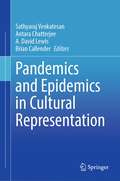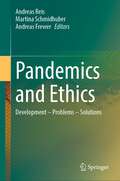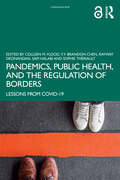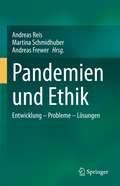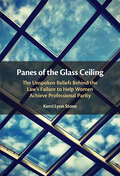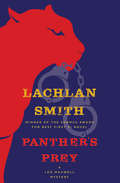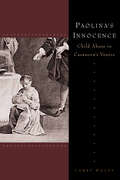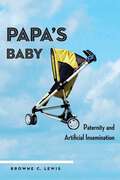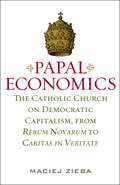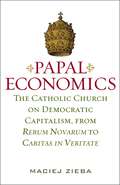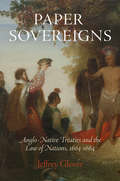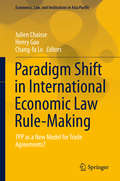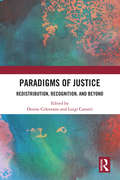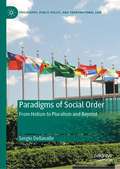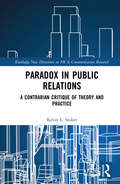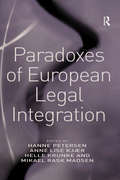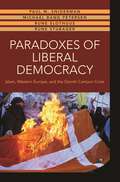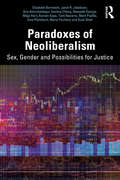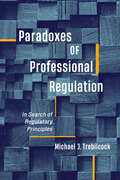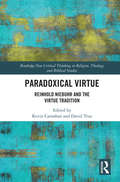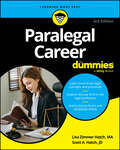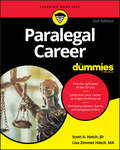- Table View
- List View
Pandemics and Epidemics in Cultural Representation
by A. David Lewis Sathyaraj Venkatesan Antara Chatterjee Brian CallenderThis edited book analyses how artists, authors, and cultural practitioners have responded to and represented episodes of epidemics/pandemics through history. Covering a broad range of notable epidemics/pandemics (black death, cholera, Influenza, AIDS, Ebola, COVID-19), the chapters examine the cultural representations of epidemics and pandemics in different contexts, periods, languages, media, and genres. Interdisciplinary in nature and drawing on perspectives from medicine, literature, medical anthropology, philosophy of medicine, and cultural theory, the book investigates and emphasizes the urgent need to reflect on past catastrophes caused by such outbreaks. By delving into cultural history, it re-examines how societies and communities have responded in the past to species-threatening epidemics/pandemics. Sure to be of interest to lay readers as well as students and researchers, this work situates epidemics and pandemics outbreaks within the contexts of culture and narrative, and their complex and layered representation, commenting on intersections of contagion, culture, and community. It offers a cross-cultural, global, and comparative analysis of the trajectories, histories and responses to various epidemics/pandemics that impacted people worldwide.
Pandemics and Ethics: Development – Problems – Solutions
by Andreas Reis Andreas Frewer Martina SchmidhuberPandemics such as Covid-19, Ebola, SARS, and influenza, as well as the necessary measures for their research, prevention, and treatment, raise a number of ethical issues that confront science, the medical profession, and health policy.This overview volume, written by renowned experts from medicine, the humanities, and the social sciences, addresses the central ethical issues in pandemics. Focusing on the disciplines of philosophy, public health, bioethics, and law, the book discusses issues of resource allocation, triage, and research, as well as restrictions on freedom, rights and duties of health professionals, and ethical aspects of digital medicine in crises. The volume is intended to serve as a handbook and to provide physicians as well as nurses, politicians and interested laypersons with valuable advice on how to deal with the difficult moral problems of epidemics and pandemics.With expert contributions by Steffen Augsberg (Giessen), Klaus Bergdolt (Cologne), Nikola Biller-Andorno (Zurich), Walter Bruchhausen (Bonn), Christiane Druml (Vienna), Hans-Jörg Ehni (Tuebingen), Alice Faust (Berlin), Sophia Forster (Erlangen-Nuremberg), Andreas Frewer (Erlangen-Nuremberg), Sara Gerke (Boston/Cambridge), Patrik Hummel (Eindhoven), Elena Jirovsky-Platter (Vienna), Katharina Kieslich (Vienna), Otmar Kloiber (Ferney-Voltaire), Ulrich H. J. Körtner (Vienna), Eva Kuhn (Bonn), Georg Marckmann (Munich), Timo Minssen (Copenhagen), Tim Nguyen (Geneva), Barbara Prainsack (Vienna), Andreas Reis (Geneva), Anita Rieder (Vienna), Stephan Rixen (Bayreuth), Lana Saksone (Berlin), Martina Schmidhuber (Graz), Harald Schmidt (Philadelphia), Annabel Seebohm (Brussels), Daniel Strech (Berlin), Sebastian Wäscher (Zurich), Hans-Werner Wahl (Heidelberg), Stefanie Weigold (Berlin), and Lena Woydack (Berlin).
Pandemics, Public Health, and the Regulation of Borders: Lessons from COVID-19
by Colleen M. Flood Sam Halabi Sophie Thériault Raywat Deonandan Y.Y. Brandon ChenThis book examines how the COVID-19 pandemic has engendered a new and challenging environment in which borders drawn around people, places, and social structures have hardened and new ones have emerged.Over the course of the COVID-19 pandemic, borders closed or became unwelcoming at the international, national, sub-national, and local levels. Debate persists as to whether those countries and territories that tightly managed their borders, like New Zealand, Australia, or Hong Kong, got it ‘right’ compared to those that did not. Without doubt, a majority of those who suffered and died throughout the pandemic have been those from vulnerable populations. Yet on the other hand, efforts taken to manage the spread of the disease, such as through border management, have also disproportionately affected those who are most vulnerable. How then is the right balance to be struck, acknowledging, too, the economic and other imperatives that may dissuade governments from taking public health steps? This book considers how international organizations, countries, and institutions within those countries should conceive of, and manage, borders as the world continues to struggle with COVID-19 and prepares for the next pandemic. Engaging a range of international, and sub-national, examples, the book thematizes the main issues at stake in the control and management of borders in the interests of public health.This book will be of considerable interest to academics in the fields of health law, anthropology, economics, history, medicine, public health, and political science, as well as policymakers and public health planners at national and sub-national levels.
Pandemics: Insurance and Social Protection (Springer Actuarial)
by María del Carmen Boado-Penas Julia Eisenberg Şule ŞahinThis open access book collects expert contributions on actuarial modelling and related topics, from machine learning to legal aspects, and reflects on possible insurance designs during an epidemic/pandemic.Starting by considering the impulse given by COVID-19 to the insurance industry and to actuarial research, the text covers compartment models, mortality changes during a pandemic, risk-sharing in the presence of low probability events, group testing, compositional data analysis for detecting data inconsistencies, behaviouristic aspects in fighting a pandemic, and insurers’ legal problems, amongst others.Concluding with an essay by a practicing actuary on the applicability of the methods proposed, this interdisciplinary book is aimed at actuaries as well as readers with a background in mathematics, economics, statistics, finance, epidemiology, or sociology.
Pandemie als nicht alltägliches Event-Risk: Auf der Suche nach Resilienz für Staaten, Unternehmen, Banken und Vermögen
by Clemens Renker Tatiana NikitinaSchnell und agil lieferten erstmals via Zoom-Seminare renommierte Wissenschaftler aus Deutschland, Russland und Polen während der Pandemie 2020/2021 Antworten für mehr Widerstandsfähigkeit in Wirtschaft und Gesellschaft. Die zusammengefassten Beiträge bieten Lösungsanstöße für wirtschaftliche, soziale, rechtliche und gesellschaftliche Fragen aufgrund der Auswirkungen von COVID-19. Insbesondere werden die internationale Unternehmensbesteuerung, die Zukunft des Bankensektors, die Stabilität des Arbeitsmarktes, Entwicklungen auf den Immobilienmärkten, Optimierungen der städtischen Logistik, Herausforderungen für das Gesundheitssystems, die Sicherung der Beschäftigung, Probleme des Rentensystems und innovative Geschäftsmodelle thematisiert. Das International Centre for Financial Markets Research ICFMR der Staatlichen Universität für Wirtschaft Sankt Petersburg und der „Petersburger Dialog“ unterstützten die laufende Partnerschaft zwischen Deutschland und Russland in den schwierigen Zeiten: Für Frieden und Wohlstand.
Pandemien und Ethik: Entwicklung – Probleme – Lösungen
by Andreas Reis Andreas Frewer Martina SchmidhuberPandemien wie Covid-19, Ebola, SARS und Influenza sowie die notwendigen Maßnahmen zu ihrer Erforschung, Prävention und Behandlung werfen eine Reihe von ethischen Fragestellungen auf, mit denen Wissenschaft, Ärzteschaft und Gesundheitspolitik konfrontiert werden.Dieser Übersichtsband, verfasst von namhaften Expert*innen aus Medizin, Geistes- und Sozialwissenschaften, behandelt die zentralen ethischen Themenkomplexe in Pandemien. Mit Schwerpunkt der Disziplinen Philosophie, Public Health, Bioethik und Recht werden Fragen der Ressourcen-Verteilung, Triage und Forschung ebenso diskutiert wie Einschränkungen der Freiheit, Rechte und Pflichten von Gesundheitsberufen oder ethische Aspekte digitaler Medizin in der Krise. Das Buch soll als Handreichung dienen und Ärzteschaft wie auch Pflege, Politik und interessierten Laien wertvolle Hinweise liefern für den Umgang mit den schwierigen moralischen Problemen bei Epidemien und Pandemien.Mit Fachbeiträgen von Steffen Augsberg (Gießen), Klaus Bergdolt (Köln), Nikola Biller-Andorno (Zürich), Walter Bruchhausen (Bonn), Christiane Druml (Wien), Hans-Jörg Ehni (Tübingen), Alice Faust (Berlin), Sophia Forster (Erlangen-Nürnberg), Andreas Frewer (Erlangen-Nürnberg), Sara Gerke (Boston/Cambridge), Patrik Hummel (Erlangen-Nürnberg), Elena Jirovsky-Platter (Wien), Katharina Kieslich (Wien), Otmar Kloiber (Ferney-Voltaire), Ulrich H. J. Körtner (Wien), Eva Kuhn (Bonn/München), Georg Marckmann (München), Timo Minssen (Kopenhagen), Tim Nguyen (Genf), Barbara Prainsack (Wien), Andreas Reis (Genf), Anita Rieder (Wien), Stephan Rixen (Bayreuth), Lana Saksone (Berlin), Martina Schmidhuber (Graz), Harald Schmidt (Philadelphia), Annabel Seebohm (Brüssel), Daniel Strech (Berlin), Sebastian Wäscher (Zürich), Hans-Werner Wahl (Heidelberg), Stefanie Weigold (Berlin) und Lena Woydack (Berlin).
Panes of the Glass Ceiling: The Unspoken Beliefs Behind the Law's Failure to Help Women Achieve Professional Parity
by Kerri Lynn StonePanther's Prey (The Leo Maxwell Mysteries #4)
by Lachlan SmithIn Panther's Prey, the latest novel from Shamus Award winner Lachlan Smith, tragedy once again strikes near the heart for lawyer-detective Leo Maxwell.After working to free his father from prison in Fox Is Framed, Leo has now left private practice and is working as a public defender in San Francisco. He and his co-counsel Jordan Walker are in the midst of trial, brilliantly defending Randall Rodrigues, a mentally ill homeless man whom they contend falsely confessed to the rape of a young San Francisco socialite. After their client is acquitted, Leo and Jordan fall into an intense relationship-until Jordan is found brutally raped and murdered in her apartment. Leo, the last person known to have seen her alive, is the natural suspect, and the police are eager for payback after the Rodrigues case. The story takes a shocking turn when Leo and Jordan’s freshly acquitted client walks into the police station and offers to confess to Jordan’s murder. Upset by the rapidity with which the authorities accept this all-too-convenient confession, Jordan’s grieving father tasks Leo with investigating his daughter’s death. Leo agrees, though he knows exonerating Rodrigues will likely bring suspicion back on himself.Theorizing that he may be on the trail of a serial rapist and murderer, Leo instead uncovers a massive judicial fraud leading to the steps of the federal courthouse. In an explosive final confrontation, Leo will come face to face with an adversary far more powerful than any foe he has met thus far.
Paolina's Innocence: Child Abuse in Casanova's Venice
by Larry WolffIn the summer of 1785, in the city of Venice, a wealthy 60-year-old man was arrested and accused of a scandalous offense: having sexual relations with the 8-year-old daughter of an impoverished laundress. Although the sexual abuse of children was probably not uncommon in early modern Europe, it is largely undocumented, and the concept of "child abuse" did not yet exist. The case of Paolina Lozaro and Gaetano Franceschini came before Venice's unusual blasphemy tribunal, the Bestemmia, which heard testimony from an entire neighborhood-from the parish priest to the madam of the local brothel. Paolina's Innocenceconsiders Franceschini's conduct in the context of the libertinism of Casanova and also employs other prominent contemporaries-Jean-Jacques Rousseau, Carlo Goldoni, Lorenzo Da Ponte, Cesare Beccaria, and the Marquis de Sade-as points of reference for understanding the case and broader issues of libertinism, sexual crime, childhood, and child abuse in the 18th century.
Papa's Baby: Paternity and Artificial Insemination
by Browne C. LewisWhen a child is conceived from sexual intercourse between a married, heterosexual couple, the child has a legal father and mother. Whatever may happen thereafter, the child’s parents are legally bound to provide for their child, and if they don’t, they’re held accountable by law. But what about children created by artificial insemination? When it comes to paternity, the law is full of gray areas, resulting in many cases where children have no legal fathers. In Papa’s Baby, Browne C. Lewis argues that the courts should take steps to insure that all children have at least two legal parents. Additionally, state legislatures should recognize that more than one class of fathers may exist and allocate paternal responsibility based, again, upon the best interest of the child. Lewis supplements her argument with concrete methods for dealing with different types of cases, including anonymous and non-anonymous sperm donors, married and unmarried women, and lesbian couples. In so doing, she first establishes different types of paternity, and then draws on these to create an expanded definition of paternity.
Papal Economics
by Maciej Zieba"For a long time to come, this book may well be the definitive work on the economic teaching of the modern popes." --MICHAEL NOVAKThe Catholic Church has long been one of the most important--but least understood--authorities on capitalism and democracy.The confusion and controversy didn't begin with Pope Francis. For well over a century popes have offered profound reflections on the economic and political order in their social encyclicals. But this estimable intellectual tradition has often been misunderstood, with partisan groups variously proclaiming Catholic social teaching to be left-wing or right-wing, pro-socialist or pro-capitalist or even pro-"third way."Papal Economics corrects the record. Father Maciej Zieba's incisive analysis shows that the Church displays a profound understanding of democracy and--perhaps more surprising--strong support for free markets. As Father Zieba demonstrates, popes have explicitly rejected socialism while praising a democratic state and market economy.Of course, this praise is not unqualified. Papal Economics shows how the Church, especially through John Paul's teachings, distinguishes true democracy from false, and praiseworthy capitalism from the kind to be rejected. Moving beyond the narrow confines of secular discourse, Catholic social teaching highlights the dangers that arise when the market and the state are elevated to absolutes in themselves--when man's spiritual dimensions are subordinated to his material ones. Ultimately, anyone who cares about free markets and democracy must understand, and defend, the foundations on which they are built. For as John Paul suggested, in a world without truth, freedom loses its meaning, the market loses its efficiency, and democracy yields to statism.
Papal Economics: The Catholic Church on Democratic Capitalism, from Rerum Novarum to Caritas in Veritate
by Maciej ZiebaPapal Economics corrects the record about one of the most important—but least understood—authorities on capitalism and democracy: the Catholic Church. Maciej Zieba, OP—a leading interpreter of the thought of Pope John Paul II—takes readers on an enlightening tour through the Catholic Church&’s social teaching on economics and governance. Examining papal pronouncements from the late nineteenth century to the present, Zieba shows that the Church displays a profound understanding of democracy and support for free markets. But this praise is not unqualified—a major reason why secular commentators of all stripes misinterpret Catholic social teaching. Updated with a brand-new afterword explaining the controversial economic teachings of Pope Francis, Papal Economics is the essential book for understanding the proper path forward.
Paper Families: Identity, Immigration Administration, and Chinese Exclusion
by Estelle T. LauThe Chinese Exclusion Act of 1882 made the Chinese the first immigrant group officially excluded from the United States. In Paper Families, Estelle T. Lau demonstrates how exclusion affected Chinese American communities and initiated the development of restrictive U. S. immigration policies and practices. Through the enforcement of the Exclusion Act and subsequent legislation, the U. S. immigration service developed new forms of record keeping and identification practices. Meanwhile, Chinese Americans took advantage of the system's loophole: children of U. S. citizens were granted automatic eligibility for immigration. The result was an elaborate system of "paper families," in which U. S. citizens of Chinese descent claimed fictive, or "paper," children who could then use their kinship status as a basis for entry into the United States. This subterfuge necessitated the creation of "crib sheets" outlining genealogies and providing village maps and other information that could be used during immigration processing. Drawing on these documents as well as immigration case files, legislative materials, and transcripts of interviews and court proceedings, Lau reveals immigration as an interactive process. Chinese immigrants and their U. S. families were subject to regulation and surveillance, but they also manipulated and thwarted those regulations, forcing the U. S. government to adapt its practices and policies. Lau points out that the Exclusion Acts and the pseudo-familial structures that emerged in response have had lasting effects on Chinese American identity. She concludes with a look at exclusion's legacy, including the Confession Program of the 1960s that coerced people into divulging the names of paper family members and efforts made by Chinese American communities to recover their lost family histories.
Paper Sovereigns: Anglo-Native Treaties and the Law of Nations, 1604-1664
by Jeffrey GloverIn many accounts of Native American history, treaties are synonymous with tragedy. From the beginnings of settlement, Europeans made and broke treaties, often exploiting Native American lack of alphabetic literacy to manipulate political negotiation. But while colonial dealings had devastating results for Native people, treaty making and breaking involved struggles more complex than any simple contest between invaders and victims. The early colonists were often compelled to negotiate on Indian terms, and treaties took a bewildering array of shapes ranging from rituals to gestures to pictographs. At the same time, Jeffrey Glover demonstrates, treaties were international events, scrutinized by faraway European audiences and framed against a background of English, Spanish, French, and Dutch imperial rivalries.To establish the meaning of their agreements, colonists and Natives adapted and invented many new kinds of political representation, combining rituals from tribal, national, and religious traditions. Drawing on an archive that includes written documents, printed books, orations, landscape markings, wampum beads, tally sticks, and other technologies of political accounting, Glover examines the powerful influence of treaty making along the vibrant and multicultural Atlantic coast of the seventeenth century.
Paradigm Shift in International Economic Law Rule-Making: TPP as a New Model for Trade Agreements? (Economics, Law, and Institutions in Asia Pacific)
by Julien Chaisse Chang-Fa Lo Henry GaoThe TPP was negotiated among 12 economically diverse countries, including some most highly developed and rich countries (i. e. , the United States, Japan, Australia, Canada, New Zealand, and Singapore), some newly industrialized countries (i. e. , Mexico and Malaysia), and some less-developed countries (i. e. , Peru, Chile, and Vietnam). A new paradigm created in this context is that countries with vastly different economic developments can actually agree on a set of very high standards to regulate their economic activities, to liberalize their trade, and to protect intellectual property and foreign investment. The contents of the TPP also reflect its status of being a "new paradigm" as the "21st-Century Trade Agreement" and being a pioneer in rule making in many key regulatory areas. These include not only the improved and enhanced rules on traditional issues already covered by the WTO , such as goods, services, and IP rights, but also the carefully designed rules in areas that have never been addressed in the WTO or comprehensively covered in other FTAs , such as state-owned enterprises, electronic commerce, and labor and environmental issues. Although the United States has withdrawn from the TPP, the remaining countries are still putting efforts into establishing a TPP without the United States or a TPP with China. Economically speaking, the current 11 parties account for about 20 % of the global economy. If such agreement is put into force, there will be significant implications for the region, for the multilateral system, and even for other FTAs. The book addresses the potential of the TPP to change the ways trade and investments are conducted and argues for its potential to be the start of an international trade/economic law revolution. The book elaborates the relationship between the TPP and other existing trade agreements such as the WTO and other FTAs and explains how the TPP is to deal with traditional and new issues. Taken together, the authors argue that the implications of the TPP go beyond its current membership. It is hoped that the book will make an important contribution to the field of international economic law.
Paradigms of Justice: Redistribution, Recognition, and Beyond
by Denise Celentano; Luigi CarantiThis book explores the relation between redistribution and recognition, two key paradigms in the contemporary discourse on justice. Combining insights from the traditions of critical social theory and analytical political philosophy, the volume offers a multifaceted exploration of this incredibly inspiring conceptual couple from a plurality of perspectives. The chapters engage with concepts such as universal basic income, property-owning democracy, poverty, equality, self-respect, pluralism, care, and work, all of which have an impact on individuals’ recognition as well as on distributive policies. An important contribution to the field of political and social philosophy, the volume will be useful to scholars and researchers of politics, law, human rights, economics, social justice, as well as policymakers.
Paradigms of Social Order: From Holism to Pluralism and Beyond (Philosophy, Public Policy, and Transnational Law)
by Sergio DellavalleNo social life is possible without order. Order being the most constituent element of society, it is not surprising that so many theories have been developed to explain what social order is and how it is possible, as well as to explore the features that social order acquires in its different dimensions. The book leads these many theories of social order back to a few main matrices for the use of theoretical and practical reason, which are defined as 'paradigms of order'. The plurality of conceptual constructs regarding social order is therefore reduced to a manageable number of theoretical patterns and an intellectual map is produced in which the most significant differences between paradigms are clearly outlined. Furthermore, the 'paradigmatic revolutions' are addressed that marked the most relevant turning points in the way in which a 'well-ordered society' should be understood. Against this background, the question is discussed on the theoretical and practical perspectives for a cosmopolitan society as the only suitable possibility to meet the global challenges with which we are all presently confronted.
Paradox in Public Relations: A Contrarian Critique of Theory and Practice (Routledge New Directions in PR & Communication Research)
by Kevin L. StokerParadox in Public Relations: A Contrarian Critique of Theory and Practice is a thought-provoking exploration of public relations, aiming to promote changes in meaning and perception by creating new meta-realities for public relations. The term “Public Relations” was embraced by early practitioners primarily because it sounded more professional than the often-pejorative alternatives. This book argues for a reframing of some of the popular realities associated with modern-day public relations and uses psychological and organizational change theory to critique paradoxes in public relations theory and practice. By examining public relations through the lens of paradox, we can begin to identify the logical fallacies that have inhibited progress and innovation in public relations practice and theory. The book explores the paradoxical nature of key concepts, including public interest, relationship management, accountability, stewardship, loyalty, community, and ethics. It also recommends new conceptualizations for understanding the field. This book will be of interest to media, communication, public relations, and advertising faculty and graduate students, particularly those interested in public relations theory and ethics. Scholars from other disciplines can also use this exploration of paradox in PR as a learning tool for identifying logical fallacies and inconsistencies.
Paradoxes of European Legal Integration
by Mikael Rask Madsen Anne Lise KjærFocusing on paradoxes and tensions of European legal integration, this book investigates four complex and inherently contradictory processes - constitutionalization and democratization, institution-building and market-making, cross-cultural communication and European discourse, and cultural exceptionalism and normalization - to offer a new framework for understanding contemporary European integration. The volume features contributions from some of the biggest names in European legal philosophy, to include Neil MacCormick, Yves Dezalay and Bryant Garth, Pierre Legrand, Heikki Mattila and David Nelken. It presents a timely, interdisciplinary approach to an important and topical area and will be of interest to those concerned with the place of socio-legal processes, language and culture in the continuous advancement of the EU project.
Paradoxes of Liberal Democracy: Islam, Western Europe, and the Danish Cartoon Crisis
by Paul M. Sniderman Rune Stubager Michael Bang Petersen Rune SlothuusIn 2005, twelve cartoons mocking the prophet Mohammed appeared in the Danish newspaper Jyllands-Posten, igniting a political firestorm over demands by some Muslims that the claims of their religious faith take precedence over freedom of expression. Given the explosive reaction from Middle Eastern governments, Muslim clerics, and some Danish politicians, the stage was set for a backlash against Muslims in Denmark. But no such backlash occurred.Paradoxes of Liberal Democracy shows how the majority of ordinary Danish citizens provided a solid wall of support for the rights of their country's growing Muslim minority, drawing a sharp distinction between Muslim immigrants and Islamic fundamentalists and supporting the civil rights of Muslim immigrants as fully as those of fellow Danes—for example, Christian fundamentalists. Building on randomized experiments conducted as part of large, nationally representative opinion surveys, Paradoxes of Liberal Democracy also demonstrates how the moral covenant underpinning the welfare state simultaneously promotes equal treatment for some Muslim immigrants and opens the door to discrimination against others.Revealing the strength of Denmark’s commitment to democratic values, Paradoxes of Liberal Democracy underlines the challenges of inclusion but offers hope to those seeking to reconcile the secular values of liberal democracy and the religious faith of Muslim immigrants in Europe.
Paradoxes of Neoliberalism: Sex, Gender and Possibilities for Justice (Social Justice)
by Janet Jakobsen and Elizabeth BernsteinFrom the rise of far-right regimes to the tumult of the COVID-19 pandemic, recent years have brought global upheaval as well as the sedimentation of longstanding social inequalities. Analyzing the complexities of the current political moment in different geographic regions, this book addresses the paradoxical persistence of neoliberal policies and practices, in order to ground the pursuit of a more just world. Engaging theories of decoloniality, racial capitalism, queer materialism, and social reproduction, this book demonstrates the centrality of sexual politics to neoliberalism, including both social relations and statecraft. Drawing on ethnographic case studies, the authors show that gender and sexuality may be the site for policies like those pertaining to sex trafficking, which bundle together economics and changes to the structure of the state. In other instances, sexual politics are crucial components of policies on issues ranging from the growth of financial services to migration. Tracing the role of sexual politics across different localities and through different political domains, this book delineates the paradoxical assemblage that makes up contemporary neoliberal hegemony. In addition to exploring contemporary social relations of neoliberal governance, exploitation, domination, and exclusion, the authors also consider gender and sexuality as forces that have shaped myriad forms of community-based activism and resistance, including local efforts to pursue new forms of social change. By tracing neoliberal paradoxes across global sites, the book delineates the multiple dimensions of economic and cultural restructuring that have characterized neoliberal regimes and emergent activist responses to them. This innovative analysis of the relationship between gender justice and political economy will appeal to: interdisciplinary scholars in social and cultural studies; legal and political theorists; and the wide range of readers who are concerned with contemporary questions of social justice.
Paradoxes of Professional Regulation: In Search of Regulatory Principles
by Michael J. TrebilcockOccupational licensure, including regulation of the professions, dates back to the medieval period. While the guilds that performed this regulatory function have long since vanished, professional regulation continues to this day. For instance, in the United States, 22 per cent of American workers must hold licenses simply to do their jobs. While long-established professions have more settled regulatory paradigms, the case studies in Paradoxes of Professional Regulation explore other professions, taking note of incompetent services and the serious risks they pose to the physical, mental, or emotional health, financial well-being, or legal status of uninformed consumers. Michael J. Trebilcock examines five case studies of the regulation of diverse professions, including alternative medicine, mental health care provision, financial planning, immigration consulting, and legal services. Noting the widely divergent approaches to the regulation of the same professions across different jurisdictions – paradoxes of professional regulation – the book is an attempt to develop a set of regulatory principles for the future. In its comparative approach, Paradoxes of Professional Regulation gets at the heart of the tensions influencing the regulatory landscape, and works toward practical lessons for bringing greater coherence to the way in which professions are regulated.
Paradoxical Virtue: Reinhold Niebuhr and the Virtue Tradition (Routledge New Critical Thinking in Religion, Theology and Biblical Studies)
by Kevin Carnahan David TrueAfter the re-emergence of the tradition of virtue ethics in the early 1980s Reinhold Niebuhr has often served as a foil for authors who locate themselves in that tradition. However, this exercise has often proved controversial. This collection of essays continues this work, across a wide range of subjects, with the aim of avoiding some of the polemics that have previously accompanied it. The central thesis of this book is that putting the work of Reinhold Niebuhr and Christian realism in dialogue with contemporary virtue theory is a profitable undertaking. An introductory essay argues against locating Niebuhr as a consequentialist and in favour of thinking of his work in terms of a dispositional ethics Contributors take different positions on whether Niebuhr’s dispositional ethics should be considered a form of virtue ethics or an alternative to virtue ethics. Several of the articles relate Niebuhr and Christian realism to particular virtues. Throughout there is an appreciation of the ways in which any Niebuhrian approach to dispositional ethics or virtue must be shaped by a sense of tragedy, paradox, or irony. The most moral disposition will be one which includes doubts about its own virtue. This volume allows for a repositioning of Niebuhr in the context of contemporary moral theory as well as a rereading of the tradition of virtue ethics in the light of a distinctly Protestant, Christian realist and paradoxical view of virtue. As a result, it will be of great interest to scholars of Niebuhr and Christian Ethics and scholars working in Moral Philosophy and the Philosophy of Religion more generally.
Paralegal Career For Dummies
by Scott A. Hatch Lisa Zimmer HatchThe verdict is in: this is the must-have resource for aspiring paralegals everywhere! Looking for a new, lucrative, and rewarding career in the legal field? Have you considered becoming a paralegal? In Paralegal Career For Dummies, you'll find everything you need to know about how to begin an exciting new chapter in your professional journey. This hands-on guide walks you choosing what type of law firm you should work in, becoming certified, and networking with others in the field. It's also full of the legal concepts and procedures you need to understand to succeed in this area, including legal drafting, research, interviews, and more. Plus, go online for a treasure trove of complimentary online resources such as forms, templates, and examples of legal memos, summons letters, and special verdict forms. You'll also find: Ways to use AI to assist in preparing legal documents, emails, and case summaries Up-to-date info about common software programs used to manage clients, do legal research, and track deadlines Strategies for creating digital trial notebooks Updated information regarding paralegal associations and their certification exams Growing at the brisk pace of almost 40,000 new positions every single year, the paralegal field always needs bright, motivated, and effective applicants. Become one of them with Paralegal Career For Dummies!
Paralegal Career For Dummies (For Dummies)
by Scott A. Hatch Lisa Zimmer HatchYour career as a top-notch paralegal starts here The demand for paralegal professionals is exploding, and Paralegal Career For Dummies, 2nd Edition explains the skills and requirements needed to pursue this rewarding career. Inside, you’ll discover the ins and outs of paralegal skills, from preparing documents and performing legal research to obtaining certification, job hunting, and understanding legal concepts. Use this hands-on guide to help in your career considerations, bolster your paralegal training, or as an everyday on-the-job reference. Paralegal Career For Dummies will be your trusty assistant through all phases of your life as a paralegal, taking you forward with tips on networking and joining professional organizations that will enhance your career. Discover the job skills required for success as a paralegal Learn important legal concepts you’ll need on the job Access forms, templates, and examples on the companion website Develop strategies to manage time and advance your career Complete with a companion website containing a wealth of valuable information, this book covers everything you need to become a top-notch paralegal.
